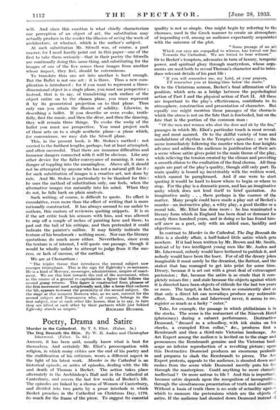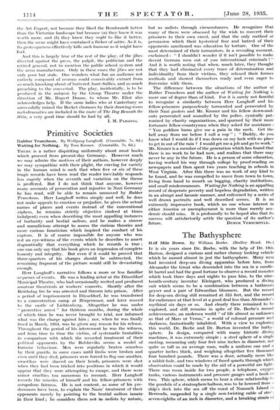Poetry, Drama and Satire
Murder in the Cathedral. By T. S. Eliot. (Faber. 5s.)
The Dog Beneath the Skin. By W. H. Auden and Christopher Isherwood. (Faber. 7s. 6d.) ARTISTS, it has been said, usually know what is best for themselves. And certainly Mr. Eliot's preoccupation with religion, in which many critics saw the end of his poetry and the stultification of his criticism, wears a different aspect in the light of his latest work. Murder in the Cathedral is an historical episode, or series of episodes, dealing with the life and death of Thomas a Becket. The action takes place alternately in the Archbishop's Hall and in the Cathedral at Canterbury, and covers the last few weeks of Becket's life. The episodes are linked by a chorus of Women of Canterbury, and divided into two parts by a prose interlude in which Becket preaches in the Cathedral on Christmas Day, 1170. So much for the frame of-the piece: To- suggest its essential
quality is not so simple. One might begin by referring to the choruses, used in the Greek manner to create an atmosphere of impending evil, among an audience expectantly acquainted with the outcome of the plot.
" Some presage of an act
Which our eyes are compelled to witness, has forced our feet Towards, the Cathedral. We are forced to bear witness.".
Or to Becket's tempters, advocates in turn of luxury, temporal power, and spiritual glory through martyrdom, whose argu- ments are used both to reveal Thomas's character and to intro- duce relevant details of his past life :
" If you will remember me, my Loi.d, at your prayers, I'll remember you at kissing-time below the stairs."
Or to the Christmas sermon, Becket's final affirmation of his position, which acts -as a bridge between the psychological action of Part I and the physical action of Part IL All these are important to the play's effectiveness, contribute to its atmosphere, construction and presentation of character. But equally one might mention those passages of the chorus in which the stress is not on the fate that is foreboded, but on the fate that is the portion of the common man :
" Of the men and women who shut the door and sit by the fire," passages in which Mr. Eliot's particular touch is most reveal-
ing and most assured. Or to the skilful variety of tone and modulations of rhSrthm in the Tempter's speeches ; or to the scene immediately following the murder when the four knights advance and address the audience in justification of their act:
a scene whose satire gives point to the main theme of the play, while relieving the tension created by the climax and providing a smooth elision to the exaltation of the final chorus. All these again are part of the play's quality, though still only part. Its main quality is bound up inextricably with the written word, which cannot be paraphrased. And if one were to start
quoting it would be hard to know where to begin or where to stop. For the play is a dramatic poem, and hasan imaginative unity which does not lend itself to brief quotation. An imaginative unity . there perhaps is the essence of the matter. Many people could have made a play out of Becket's murder—an instructive play, a witty play, a good thriller or a
moral tale., Mr. Eliot has done more : he, has reanimated a literary form which in England has been dead or dormant for nearly three hundred years, and in doing so he has found him-
self anew as a poet, only with an added ease, lucidity and objectiveness.
In contrast to Murder in the Cathedral, The Dog Beneath the
Skin is a shoddy affair, a half-baked little satire which gets nowhere. If it had been written by Mr. Brown and Mr. Smith, instead of by two intelligent young men like Mr. Auden and Mr. Isherwood, nobody would have bothered to.publish it, and nobody would have been the loser. For of all the dreary jokes imaginable it must surely be the dreariest, the flattest, and the stalest that has managed to get into print for some time. Dreary, because it is set out with a great deal of extravagant pretension ; flat, because the satire is so' crude that it com- pletely misses fire ; and stale because the.objects against which it is directed have been objects of ridicule for the last ten years or more. The target, in fact, has been so consistently shot at that only a direct hit can nowadays produce any noticeable effect. Messrs. Auden and Isherwood never, it seems to me, register so much as a lucky " outer."
- Take, for example, the passage in which philistiniam is in the stocks. The scene is the restaurant of the Nineveh Hotel (plutocracy) during a cabaret performance. Destructive Desmond, " dressed as a schoolboy, with ink stains on his cheeks, a crumpled Eton collar," &c., produces first a Rembrandt and then a third-rate Victorian landscape. An Art Expert among the audien3e is invited on to the stage and pronounces the Rembrandt genuine and the Victorian land- scape an inferior reproduction of a revolting picture; upon this Destructive DesmOnd produces an enormous penknife and prepares to slash the Rembrandt to pieces. The Art Expert protests, appeals to the audience, is shouted down and rushes from the scene while Desmond merrily puts his fist through the masterpiece. Could anything be more clumsily ineffectual ? Or more untrue to life ? And this is important, because satire depends upon the recognition of incongruities, through the simultaneous presentation of truth and absurdity. Without a basis of truth there is no scale of actuality against which to measure the pretensions which are the objects of satire. 'If the audience had shouted down Desmond instead of the Art Expert, not because they liked the Rembrandt better than the Victorian landscape but because (a) they knew it was worth more, and (b) they knew they ought to like it better, then the scene might have contained a flicker of satire. As it is, its grotesqueness effectively kills such humour as it might have had.
And this is largely true of the rest of the play, of the jibes directed against the press, the pulpit, the politician and the retired general, not to mention the public school system and the arms manufacturer. Only in these cases the jibes are not only poor but stale. One wonders what fun an audience not entirely composed of morons could conceivably extract from so much knocking about of battered Aunt-Sallies, and so much preaching to the converted. The play, incidentally, is to be produced in the autumn by the Group Theatre under the direction of Mr. Rupert Doone, to whom Mr. Eliot also acknowledges help. If the same ladies who at Canterbury so successfully ruined the Becket choruses by their drawing-room melodramatics are included in the caste of The Dog Beneath the Skin, a very good time should be had by all.
I. M. PARSONS.







































 Previous page
Previous page